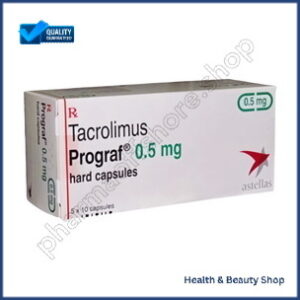ADDICTION
ALCOHOL DEPENDENCE
QUIT SMOKING
ALLERGY
ANTI FUNGAL
FUNGAL INFECTION
FUNGAL NAIL INFECTIONS
ANTI-REJECTION DRUGS
ANTI WORM
ANTIBIOTIC
BACTERIAL INFECTIONS
ARTHRITIS
GOUT
OSTEOARTHRITIS
RHEUMATOID ARTHRITIS
BLOOD
LOW PLATELET COUNT
THROMBOPHLEBITIS
VARICOSE VEINS
COLON
ANAL FISSURE
PILES
ULCERATIVE COLITIS
DIABETES CARE
DIABETES INSIPIDUS
DIABETES TYPE
DIABETIC FOOT ULCERS
GLUCOSE MONITOR
EYES/EAR CARE
DRY EYES
EYE CARE
EYE EXAMINATION
EYE INFECTION
EYE LASHES
EYE PAIN
GLAUCOMA
OCULAR HYPERTENSION
UVEITIS
FEVER CARE
MALARIA
RHEUMATIC FEVER
TYPHOID FEVER
GASTROINTESTINAL
ACIDITY
CONSTIPATION
CROHN'S DISEASE
DIARRHOEA
GALLBLADDER STONES
INTESTINAL ULCERS
IRRITABLE BOWEL SYNDROME
MOTION SICKNESS
NAUSEA
Siromus (Sirolimus)
| Active Ingredient (Generic Name): | Sirolimus |
|---|---|
| Indication: | Prevention of kidney transplant rejection |
| Manufacturer: | Zydus Cadila Pharma |
| Packaging: | 6 tablets in one strip |
| Strength: | 1 mg |
From: $194.00
Siromus (Sirolimus) is essential post-transplant to prevent rejection. As an mTOR inhibitor, it regulates cell growth and is crucial after surgery. It treats renal cell carcinoma and certain genetic conditions, affecting immune responses positively. Administer as directed, swallow whole with water daily, and contact your provider if a dose is missed. Watch for side effects like ulcers or rash, and store at room temperature correctly. Inquire about insurance coverage and buy from reputable sources. Siromus is key for transplant success, supporting organ acceptance. Check with your healthcare provider or pharmacist for more on this essential medication’s prescription and uses.
When starting to explore the topic of Sirolimus, it’s essential to grasp its mechanism of action and potential benefits for patients. Sirolimus, also known as Rapamune, belongs to a class of medications called mTOR inhibitors. Its primary mode of action involves inhibiting the mTOR pathway, a critical signaling pathway in cells that regulates cell growth, proliferation, and survival. By blocking this pathway, Sirolimus helps prevent the growth of certain cells, particularly those involved in immune responses and cancer.
As you investigate the intricacies of Sirolimus, you’ll find that this medication is commonly used in transplant medicine to prevent organ rejection. Additionally, Sirolimus has shown promise in treating certain types of cancers, such as renal cell carcinoma. Its immunosuppressive properties make it a valuable tool in managing autoimmune diseases like lupus nephritis.
Understanding the mechanisms and potential applications of Sirolimus lays a solid foundation for appreciating its role in modern medicine.
Medication’s Positive Effects
Exploring Sirolimus reveals its significant positive impact on patient outcomes in various medical scenarios. This medication, also known as Rapamune, belongs to a class of drugs called mTOR inhibitors. It’s commonly used in organ transplantation to prevent rejection and improve long-term graft survival. Sirolimus works by suppressing the immune system’s response, reducing the risk of organ rejection after transplantation.
Additionally, Sirolimus has shown effectiveness in treating certain types of cancer, such as renal cell carcinoma and mantle cell lymphoma. In these cases, Sirolimus inhibits the growth of cancer cells and helps slow down disease progression.
Moreover, Sirolimus has been found to have beneficial effects in treating certain rare genetic disorders like lymphangioleiomyomatosis (LAM) and tuberous sclerosis complex (TSC). By inhibiting cell growth and proliferation, Sirolimus can help manage symptoms and improve the quality of life for patients with these conditions.
Why is this medication prescribed?
Sirolimus is prescribed to patients for specific medical conditions where inhibiting the immune response or cell growth is beneficial for treatment. This medication is commonly used in organ transplant patients to prevent rejection of the transplanted organ. By suppressing the immune system, sirolimus helps decrease the body’s natural response to the foreign organ, reducing the risk of rejection.
Furthermore, sirolimus is also prescribed for certain types of cancer. It works by inhibiting the growth of cancer cells, slowing down their proliferation and spread. In cases where other treatments haven’t been successful, sirolimus may offer a viable option for managing cancer progression.
Additionally, sirolimus is sometimes used in patients with certain types of kidney disease to help reduce proteinuria, a condition characterized by the presence of abnormal amounts of protein in the urine. By targeting specific pathways involved in kidney function, sirolimus can help improve renal health in these individuals.
How should this medicine be used?
For optimal effectiveness, administer this medication as directed by your healthcare provider. Siromus, also known as sirolimus, is typically taken once a day, at the same time each day. It’s vital to follow the instructions provided by your doctor or pharmacist carefully. Siromus should be taken consistently, either with or without food, but it’s advisable to choose one method and stick to it for each dose. Swallow the tablets whole with a full glass of water; don’t crush, break, or chew them.
It is essential to not suddenly stop taking Siromus without consulting your healthcare provider, as this could have adverse effects on your health. If you accidentally miss a dose, take it as soon as you remember, unless it’s almost time for your next scheduled dose. In that case, skip the missed dose and continue with your regular dosing schedule. Don’t take a double dose to make up for a missed one. If you have any questions or concerns about how to use Siromus, don’t hesitate to contact your healthcare provider for clarification and guidance.
Other uses for this medicine
If you’re considering other uses for Siromus, consult your healthcare provider for guidance on its potential applications beyond its primary prescribed purpose.
Siromus, also known as Sirolimus, is primarily used in transplant patients to prevent organ rejection. However, this medication has shown promise in various off-label uses.
Some studies suggest Siromus may be effective in treating certain types of cancers, such as breast cancer and certain types of kidney cancer. Additionally, research has explored its potential benefits in treating specific skin conditions like psoriasis and atopic dermatitis.
Siromus has also been investigated for its role in managing autoimmune diseases like lupus and rheumatoid arthritis. Moreover, some evidence indicates that this medication might be helpful in treating certain types of vascular malformations.
While these potential uses are promising, it’s important to remember that using Siromus for off-label purposes should only be done under the guidance and supervision of a healthcare professional to ensure safety and efficacy.
What special precautions should I follow?
When taking Sirolimus, it’s essential to check for any potential drug interactions to guarantee your safety and the effectiveness of the medication. Discuss with your healthcare provider about any other medications, supplements, or herbal products you’re currently taking to avoid any adverse effects.
Being proactive in monitoring drug interactions can help optimize the benefits of Sirolimus therapy.
Check for Drug Interactions
To guarantee your safety and the effectiveness of Sirolimus (Siromus), always check for potential drug interactions before starting or changing any medications.
Here are three essential tips to follow:
-
Consult with your healthcare provider: Before starting Sirolimus or any new medication, inform your healthcare provider about all the medicines, supplements, and herbal products you’re currently taking. This will help identify any potential interactions that could impact your treatment.
-
Research potential interactions: Take the time to research possible drug interactions with Sirolimus. Understanding how different medications can interact with each other will empower you to make informed decisions about your health.
-
Watch for side effects: Keep a close eye on how your body reacts when starting Sirolimus alongside other medications. If you notice any unusual symptoms, consult your healthcare provider immediately.
What special dietary instructions should I follow?
You should follow specific dietary instructions while taking Sirolimus (Siromus). It’s crucial to maintain a consistent diet to guarantee the medication works effectively.
Avoid consuming grapefruit or grapefruit juice as it can interact with Sirolimus and lead to potentially harmful effects. Additionally, limit your intake of high-potassium foods like bananas, oranges, and potatoes, as Sirolimus can increase potassium levels in your blood.
To prevent any complications, try to eat a balanced diet that includes a variety of fruits, vegetables, whole grains, and lean proteins. It’s advisable to consult with your healthcare provider or a nutritionist to create a suitable meal plan that aligns with your medication regimen.
Remember to stay hydrated by drinking an adequate amount of water each day, unless advised otherwise by your doctor.
What should I do if I forget a dose?
If a dose of Sirolimus (Siromus) is missed, promptly take it as soon as you remember, unless it’s almost time for the next scheduled dose. If the missed dose is close to the next dose, it’s advisable to skip the missed one and continue with the regular dosing schedule. Don’t double the dose to catch up.
It’s important to maintain a consistent intake schedule to guarantee the medication’s effectiveness. Setting a reminder or alarm can help in remembering to take Sirolimus at the prescribed times. If you have trouble remembering doses, consider using a pill organizer or asking a family member to remind you.
In case of any confusion or uncertainty about what to do when a dose is missed, consult your healthcare provider or pharmacist for guidance. Consistency in taking Sirolimus is essential for its therapeutic benefits, so make efforts to adhere to the prescribed dosing regimen as closely as possible.
What side effects can this medication cause?
Sirolimus can cause various side effects that may necessitate monitoring. Some side effects can be severe, and if you experience persistent symptoms, it’s imperative to contact your doctor immediately.
Keep an eye out for any concerning symptoms and seek medical advice promptly to guarantee your well-being.
Monitor for Persistent Symptoms
Potential side effects of Sirolimus, also known as Siromus, should be monitored for persistent symptoms. Here are three common side effects to watch out for:
-
Oral Ulcers: Sirolimus may cause mouth sores or ulcers, which can be painful and affect your ability to eat or speak. If these ulcers persist or worsen, inform your healthcare provider.
-
Skin Rash: Some individuals may develop a skin rash while taking Sirolimus. It’s essential to keep an eye on the rash and consult your doctor if it becomes bothersome or spreads extensively.
-
Swelling: Swelling in the hands, feet, or legs can occur as a side effect of Siromus. If you notice persistent swelling or sudden weight gain, seek medical advice promptly.
Some side effects can be serious. If you experience any of the following symptoms, call your doctor immediately:
Monitoring for persistent symptoms is essential, as some side effects of Siromus can be serious, requiring immediate medical attention if experienced. If you notice any of the following symptoms, contact your doctor promptly:
- Severe shortness of breath or difficulty breathing.
- Sudden chest pain or pressure.
- Unexplained swelling, especially in the hands, feet, or face.
These symptoms could indicate potentially serious complications that require urgent medical evaluation. It’s important not to ignore these signs and seek immediate help if you encounter any of them while taking Siromus. Your healthcare provider will be able to assess the situation and provide the necessary care to address these side effects promptly.
What should I know about the storage and disposal of this medication?
When storing Sirolimus, make sure to keep it at room temperature away from moisture and heat sources. Store the medication in its original packaging to safeguard it from light and moisture. Avoid storing it in the bathroom or kitchen where humidity levels can fluctuate. Keep it out of reach of children and pets to prevent accidental ingestion. Check the expiration date on the packaging and don’t use the medication if it has expired.
When it comes to disposing of Sirolimus, follow proper guidelines to guarantee environmental safety. Don’t flush the medication down the toilet or pour it down the drain unless instructed to do so. Instead, consult with your healthcare provider or pharmacist on the best way to dispose of unused or expired medication. Some pharmacies offer drug take-back programs or provide specific instructions on how to safely dispose of medications at home. By following these storage and disposal guidelines, you can help prevent misuse and protect the environment.
In case of an emergency/overdose
In an emergency or overdose situation involving Sirolimus, seek immediate medical attention by calling emergency services or contacting a poison control center. Symptoms of an overdose may include severe dizziness, fainting, difficulty breathing, or vomiting. Don’t wait for symptoms to worsen before seeking help.
Provide healthcare professionals with information such as the amount of Sirolimus taken, the time of ingestion, and any other medications being used. It’s important to follow the guidance of medical professionals to guarantee appropriate treatment. Don’t attempt to induce vomiting unless instructed by a healthcare provider. Keep the medication bottle or packaging with you to provide necessary details to the medical team.
Emergency services are equipped to handle overdose situations and will provide the necessary care. It’s vital to act swiftly in these situations to prevent any potential complications. Remember, quick action can make a significant difference in the outcome of an overdose involving Sirolimus.
What other information should I know?
To further understand Sirolimus and its effects, it’s important to be aware of additional information related to the medication. Sirolimus may interact with a wide range of medications, including certain antibiotics, antifungal drugs, and seizure medications. It’s essential to inform your healthcare provider about all the medications you’re currently taking to prevent any potential interactions.
Moreover, Sirolimus can increase your risk of developing infections and may also lead to a decrease in blood cell counts. Be vigilant for signs of infection, such as fever, chills, or sore throat, and consult your doctor promptly if you experience any of these symptoms. Regular blood tests will be necessary to monitor your blood cell counts while taking Sirolimus.
It’s vital to avoid consuming grapefruit or grapefruit juice while on Sirolimus, as it can affect the way your body metabolizes the medication. Additionally, limit your exposure to sunlight and UV rays, as Sirolimus can increase your sensitivity to sunlight, leading to sunburn more easily. If you have any concerns or questions about taking Sirolimus, don’t hesitate to discuss them with your healthcare provider.
Brand names
Consider brand names for Sirolimus as you explore different options for this medication. Sirolimus is primarily known by its brand name Rapamune, which is commonly prescribed for preventing organ rejection after transplant surgery. It is essential to be aware of the various brand names under which Sirolimus may be available to make sure you are receiving the correct medication. Here is a table listing some of the brand names of Sirolimus:
| Brand Name | Manufacturer | Strength |
|---|---|---|
| Rapamune | Pfizer | 1 mg, 2 mg |
| Torisel | Pfizer | 25 mg |
| Afinitor | Novartis | 2.5 mg, 5 mg, 10 mg |
It is important to consult with your healthcare provider or pharmacist to confirm the specific brand name prescribed to you and to understand any differences between brands that may impact your treatment.
Purchase Siromus From Pharmacies
When looking to purchase Siromus from pharmacies, consult your healthcare provider or pharmacist for guidance on obtaining the medication. Siromus, also known as sirolimus, is a prescription medication used to prevent organ rejection in people who’ve received a kidney transplant.
Your healthcare provider will assess your condition and determine if Siromus is suitable for you. Once prescribed, you can purchase Siromus from various pharmacies, including both physical stores and online pharmacies. It’s crucial to follow your healthcare provider’s instructions regarding the dosage and administration of Siromus to guarantee its effectiveness and minimize potential side effects.
Before purchasing Siromus, check with your insurance provider to see if it’s covered under your plan, as it can be a costly medication. Additionally, inquire about any available patient assistance programs that may help reduce the cost of Siromus. Always buy medication from reputable pharmacies to ensure you’re receiving a genuine product that meets safety standards.
To summarise
For a brief summary, outline the key points of the article.
Siromus, also known as sirolimus, is a medication used to prevent organ rejection after transplant surgery. It operates by suppressing the immune system to prevent it from attacking the transplanted organ. Siromus is available in pharmacies but requires a prescription due to its potent nature and potential side effects.
When purchasing Siromus, it’s important to follow the doctor’s instructions carefully, including dosage and any specific precautions. Common side effects of Siromus may include mouth sores, diarrhea, and high cholesterol levels. It’s essential to report any severe side effects or concerns to your healthcare provider promptly.
Siromus may interact with other medications, so it’s crucial to inform your doctor about all the medications you’re taking. Overall, Siromus plays an important role in ensuring the success of organ transplant surgeries by helping the body accept the new organ effectively.
Based on 0 reviews
Only logged in customers who have purchased this product may leave a review.







There are no reviews yet.